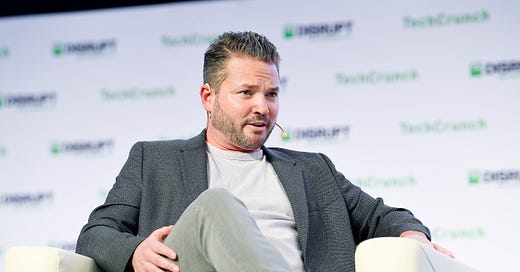Scooter Executives Head for the Exits as Once Ambitious Technology Companies Falter
A requiem for the scooter, the flying car, autonomous vehicles, and hope eternal.
Scooter executives are bailing out.
It’s an experience familiar to many errant scooter riders: you’re barreling toward a red light and you’re tapping the brakes but they aren’t working, so it’s time to jump and let the scooter go flying.
Bird’s CEO and CFO have stepped down. I’ve learned Lime’s CFO is leaving.
Travis VanderZanden — the co-founder of Bird who reportedly cashed out tens of millions worth of stock during the company’s meteoric rise in valuation — has stepped down as the company’s leader. VanderZanden will remain chairman of the company’s board. Shane Torchiana, an obscure former BCG partner who has been at Bird since 2018, is taking over as president and CEO.
Bird’s Chief Financial Officer Yibo Ling — like VanderZanden a former Uber executive — is calling it quits.
Meanwhile, Andrea Ellis, who helped Lime raise $523 million in convertible debt and term loan financing late last year, is leaving Lime, sources told me and the company confirmed.
While Lime is well-capitalized after the debt financing last year, Bird appears to be in real peril. Bird’s market capitalization has fallen to $83.4 million. Embarrassingly, the company is in trouble with the New York Stock Exchange because its share price has fallen below the minimum price of $1.
Bird’s stock closed at $0.35 Thursday and had fallen two cents Friday morning.
As of June, Bird had $57 million in cash and cash equivalents. Meanwhile, the company burned through $47 million in net cash from operating activities in the first six months of the year. It doesn’t take higher level math skills to start to wonder whether Bird’s days are numbered.
Winter is coming. Literally. The scooter business is extremely seasonal.
I wanted to take a moment to eulogize the venture scale scooter business. We’re seeing the full unraveling of the blitz scale, cash-on-fire venture model.
This is probably the end — for this tech cycle at least — of the idea that if only venture capitalists can throw enough money at something, it will become a tech company. With Juicero, WeWork, Zume Pizza, Soylent, and so many others — companies were designated “tech” startups because venture capitalists invested in them. VCs forgot that things were supposed to flow the other way.
I’m not saying scooters are actually dead. Flying car company Kittyhawk — well, that’s dead (or about to be). And there will be many other cash intensive “tech” businesses that bite the dust. Bird could survive, I guess — or sell. Lime could end up being the last man standing — and monopoly pricing could suddenly seem a lot more attractive.
But I feel confident in declaring — after catching up with former scooter employees — that this is not a venture-style business that’s going to reap venture-sized returns.
Lime can’t even bullshit me that they’re profitable. The company told me in a statement that they’re working to “drive closer to profitability.” That’s adjusted EBITDA profits that they’re driving toward. Lime isn’t profitable even if you squint and juke the stats.
“We ran the test and it turns out people don’t ride scooters. That’s just the problem,” one former scooter employee commiserated to me.
Like many ideas that attract hordes of venture capital dollars, the intuition was compelling: cheaper batteries and Chinese manufacturing paired with cellphones could make scooters a better, more sustainable business model than ride sharing. It actually seemed good for the world.
One Bird investor tried to explain the early hype. Investors had salivated over Bird’s top-line growth, this person explained to me. “I do have a note that their weekly run rate (granted it is a highly seasonal business) was over $300m. Just sharing this because if you just followed the top line numbers (not the economics) it would make it one of the fastest consumer revenue stories in venture history. (And plenty of other investments like YouTube were wildly unprofitable and had tremendous product/market fit as well that did work out). Even Google — one of the fastest growing consumer businesses ever didn’t come out this hot.”
Valuations soared. Announced in February 2018, David Sacks led the Series A at Craft which valued Bird at $60 million post-money. Sequoia led a $150 million Series C investment in Bird that valued it at $1 billion in 2018 and then led another $158 million round that valued Bird at $2.1 billion, according to Pitchbook. It was a major investment for Roelof Botha who would go on to become Sequoia’s senior steward.
Sequoia had missed out on Uber. In 2018 Uber was going public, valued at $82 billion in the IPO. This was a chance to get it right the second time.
Uber wasn’t as big of a miss as Sequoia might have thought — it’s worth $57 billion today. Bird is worth $83.4 million.
Lime is a similar story. Uber has poured hundreds of millions into the company. GV led a $330 million round in 2018 that valued Lime at $1.1 billion. Since Lime is still a private company, we don’t know what it’s worth today.
“It was the beginning of that pure VC ‘herd mentality’ period,” remembers someone from the on-demand world. “Almost everyone was trying to tell everyone over and over the economics didn’t make any sense, but no reason for anyone to listen.”





